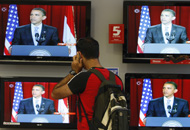Bucking Beijing
An Alternative U.S. China Policy
Aaron L. Friedberg|
Snapshot
Recent protests in Egypt have unleashed a wave of verbal assaults aimed at Obama's policy toward Cairo. But such criticisms obscure the underlying reality: Obama has deftly handled Washington's response to the Egyptian revolution, and the next occupant of the White House would be well served to heed the example of the past four years. |
Snapshot
Two new books address exactly what happened during the raid that killed Osama bin Laden. Squabbling over the details, though, misses the point. What survives in historical memory depends as much on patterns of human understanding as on the arguments churning through the news cycle. |
Snapshot
This month, protesters in the West Bank demanded the ouster of top Palestinian Authority figures. But the anger Palestinians feel toward their leaders cannot be separated from their larger frustration with the Israeli occupation and the failing peace process that created the PA in the first place. |
|
Snapshot
The protests engulfing the Middle East go to the heart of who gets to police public morality in post-Arab Spring states. Salafis see themselves as the rightful guardians of the public sphere, and they are trying to ensure others see them that way, too. |
Snapshot
Israeli Prime Minister Binyamin Netanyahu expressed outrage at the refusal of the Obama administration to set “red lines” for Iran’s progress on its nuclear program. But it is Americans who ought to be incensed with Netanyahu. He is demanding that Washington do far more to protect Israel’s security than it does for any of its other allies. |
Comment
In light of the killing of the U.S. ambassador, it’s tempting to be pessimistic about Libya. But just a year after the fall of a long-standing tyrant, the country is moving on and has peacefully elected a new government. As it turns out, building a functioning state from scratch can be a good thing. |
Books & Reviews

Bastasin’s book is worth reading for its detailed political narrative of the eurozone crisis to date, drawn largely from journalistic sources and focusing on the interaction among decision-makers in Europe’s capitals.
In the Magazine
As a referendum on Scotland’s independence looms, the question of the region’s place in the United Kingdom has become the most pressing issue in British politics. Its experience shows how a smart secessionist party can dismantle a functioning country, and how central governments eager to buy off regions can end up making matters worse.








